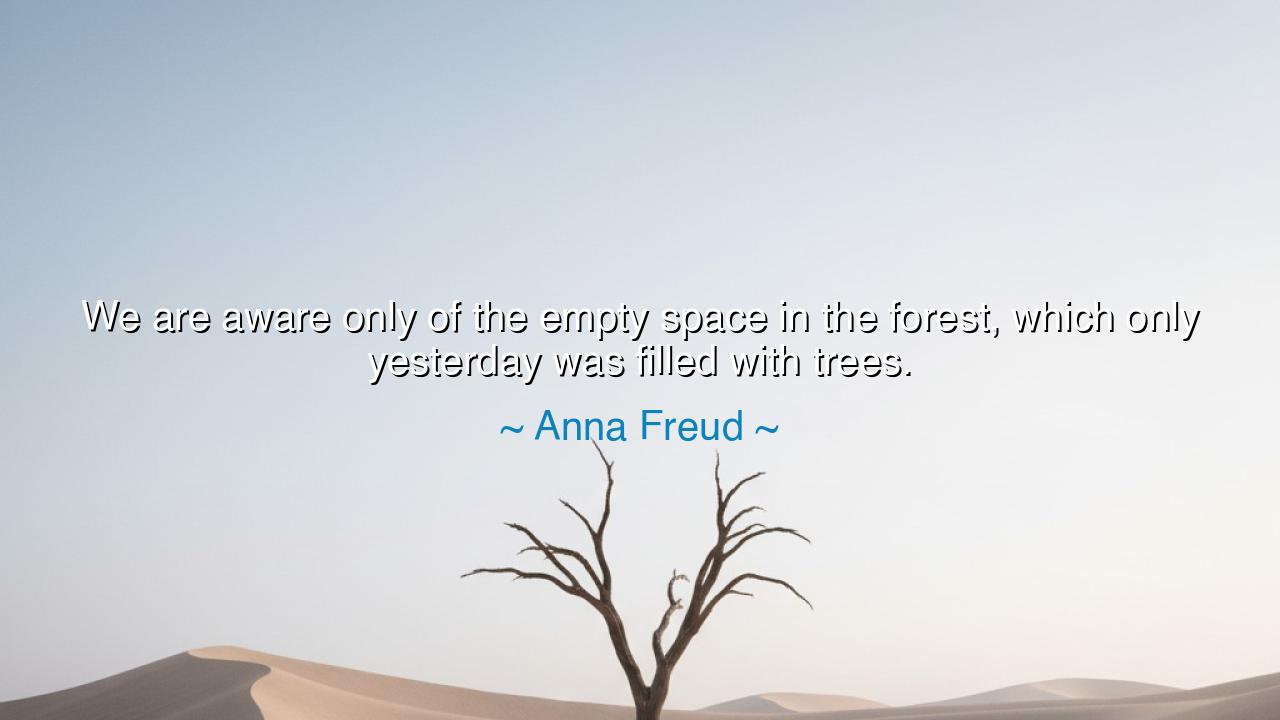
We are aware only of the empty space in the forest, which only
We are aware only of the empty space in the forest, which only yesterday was filled with trees.






When Anna Freud wrote, “We are aware only of the empty space in the forest, which only yesterday was filled with trees,” she was speaking not merely of nature, but of the human soul. Her words, quiet yet piercing, describe the pain of loss—that strange awareness that dawns only after something once living and vibrant is gone. The forest she speaks of is both real and symbolic. It is the forest of the world, cut down by the passage of time, and it is also the forest of the heart, emptied by the departure of those we love, the fading of dreams, or the ending of what once gave us meaning. Her observation, drawn from her deep understanding of the psyche, reveals a truth the ancients long knew: that the human spirit often perceives value only in absence, not in presence.
In the lineage of her father, Sigmund Freud, Anna devoted her life to understanding the inner wilderness of the mind. Yet where her father studied the forces that drive desire, Anna often reflected on the forces that accompany loss—especially the emptiness that follows destruction. Her quote arose from that insight. We live surrounded by wonders—by trees of life, both literal and metaphorical—and yet our eyes remain blind to them. Only when they are felled, when the forest of our daily blessings is stripped bare, do we suddenly see the space they once filled. Only then do we awaken to the magnitude of what was. This is the sorrow of memory and the wisdom of grief: that awareness comes too late, and that appreciation too often walks hand in hand with mourning.
In the manner of the ancients, Anna Freud’s words echo the wisdom of prophets and poets who have warned of this blindness through the ages. The Greeks spoke of Hubris, that arrogance which takes abundance for granted until the gods send ruin to teach humility. So too did the Stoics remind men to “practice loss” each day—to imagine the absence of all they cherish, so they might treasure it more deeply while it remains. The forest, to Anna Freud, represents not only the natural world but the inner world of gratitude—that sacred realm where recognition must dwell before it is too late. Her lament, then, is not one of despair alone, but of awakening: it is a call to remember that life’s fullness is fragile, and that all we love is borrowed, not owned.
Consider the story of the American Dust Bowl in the 1930s—a modern echo of Freud’s forest. Farmers, eager for growth and profit, plowed the plains and cut down the native grasses that had held the soil for centuries. For a time, it seemed a triumph of human industry. But when the winds came, the earth turned to dust, and the land became a wasteland. Only then did people see the empty space where the living ecosystem had been—the forest of grass that had sustained life for generations. They saw, too late, the value of what had been lost. Anna Freud’s insight lives within that tragedy: humanity awakens to awareness not through abundance, but through the silence that follows its destruction.
Yet her words are not only about the loss of nature or material things—they also describe the grief of the heart. When someone we love dies or departs, our minds turn not to the living presence they once were, but to the void that remains. The rooms they filled, the laughter that once echoed, the warmth that once comforted—all these become like clearings in a forest that has been cut down. The emptiness hurts because it reminds us of the fullness that came before. This, too, is a natural process of the soul. To grieve is to stand in that clearing, to stare into the hollow, and to remember the trees—to honor what once was, even as we learn to walk through the silence that follows.
But there is another lesson in her words—one of hope, if we listen deeply. For every forest that is cleared, new life can begin again. Awareness, once awakened, becomes the seed of renewal. To feel the loss of the forest is to begin to understand its value, and that understanding can become the foundation for rebirth and restoration. In this sense, Anna Freud’s insight is not a lament for what is gone, but a call to consciousness—to recognize what we have before it vanishes. If we learn to cherish the trees while they stand, to honor the relationships, the earth, and the moments of our lives while they live, then we may prevent some of the emptiness that her words mourn.
So let this wisdom be passed down like an ancient teaching: awareness must precede absence. Look around you—the people, the beauty, the quiet blessings of each day—these are the trees of your forest. Do not wait until they are gone to see their worth. Honor them now. Protect what gives you life—your planet, your family, your peace. For when the forest falls silent, when the world grows bare and memory is all that remains, you will understand too late the sacredness of what once was. Anna Freud’s words are both a mirror and a warning: see now, before it vanishes; love now, before it leaves; protect now, before it is lost. For the forest of life is fleeting, and once it is gone, even the silence will ache.






AAdministratorAdministrator
Welcome, honored guests. Please leave a comment, we will respond soon